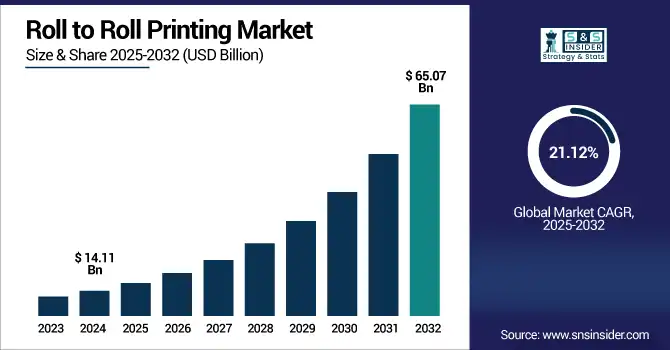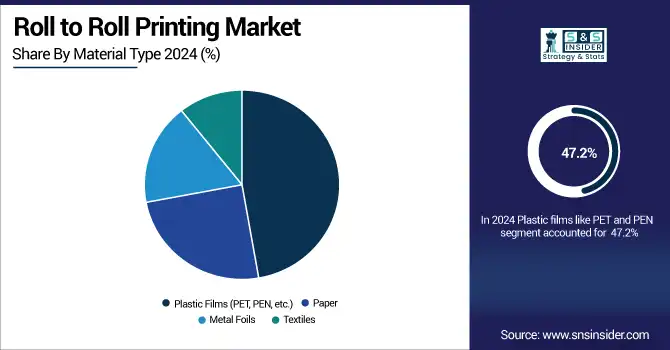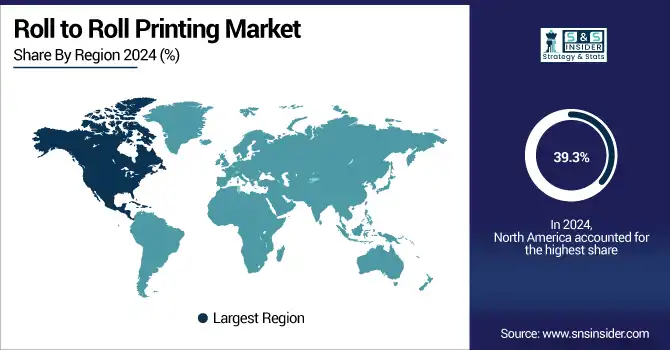Roll-to-Roll Printing Market Size & Trends:
The Roll-to-Roll Printing Market size was valued at USD 14.11 billion in 2024 and is expected to reach USD 65.07 billion by 2032, growing at a CAGR of 21.12% over the forecast period of 2025-2032. Roll-to-Roll Printing Market trends are driven by advancements in flexible electronics and printed sensor technologies. Increasing adoption in consumer electronics, healthcare, and energy sectors is accelerating market expansion.

To Get more information on Roll to Roll Printing Market- Request Free Sample Report
Growth of Roll-to-Roll Printing Market support a sustainable manufacturing process, advanced operational efficiency of low material waste, and lower energy consumption through their rapid production of flexible electronics by using very few raw materials. Additionally, the growing demand for smart packaging and IoT integrated labeling is pulling several key opportunities for the demand growth. Moreover, improvements in conductive inks and hybrid printing methods are improving the performance and reliability of the printed parts. Supportive government policies for green technologies, changing printing standard, and other factors are further adding to your market figure.
E Ink Holdings reported a 25% increase in adoption of roll-to-roll printed e-paper displays in electronic shelf labels and signage during 2025, supporting energy-efficient applications.
The U.S Roll-to-Roll Printing Market size was valued at USD 4.25 billion in 2024 and is expected to reach USD 19.19 billion by 2032, growing at a CAGR of 20.80% over the forecast period of 2025-2032. The U.S. Roll-to-Roll Printing Market is trending because of the increasing demand for flexible electronics, government support for sustainable manufacturing, and growing use of roll to roll printing technology in smart packaging, healthcare wearable, and energy applications.
Roll-to-Roll Printing Market Dynamics:
Drivers:
-
Rising Demand for Flexible Low Cost Electronics Drives Growth in Roll-to-Roll Printing Market
Growing demand for lightweight, flexible, and low-cost electronic components in the industrial, consumer electronics, automotive, healthcare, and energy sectors is a key factor driving the global Roll-to-Roll Printing Market growth. Conventional R2R printing enables high-throughput, roll-to-roll process that can lower the manufacturing cost and material waste in a tremendous way. Such efficiency is pretty great as they are used to create flexible displays, printed sensors, and solar films. The growing trend of wearable devices and miniaturized IoT components also drives the demand for scalable, high-throughput printing methods.
Pilot shipments in 2024 included 850,000 printed glucose-sensing patches, showcasing scalable R2R fabrication of medical wearables.
Restraints:
-
Printing Defects and Material Limitations Restrict Advanced Applications in Roll to Roll Printing Technology
A Major Restraint in Roll to Roll (R2R) Printing Market is primarily due to inherent printing defects caused by variations in substrate properties, ink formulation, and environmental conditions, which are far more difficult to be detected and corrected in real-time. Moreover, R2R processes are not compatible with some advanced materials or multi-layer components, which limit the application fields of R2R in functional printing for sophisticated electronic modules and components
Opportunities:
-
Innovations in Conductive Inks and Substrates Unlock Growth in Smart Packaging RFID and Printed Batteries
Key area of opportunity is the innovation of high performing yet long-lasting conductive inks and printable substrates. In addition, it also creates new business opportunities with other applications such as the growth in smart packaging, RFID /NFC labeled goods, and printed batteries.
In 2024, hybrid graphene–silver composite inks delivered sheet resistances as low as 0.08 Ω/sq, enabling highly conductive, inkjet-printed e-textiles
Challenges:
-
Lack of Testing Standards and Integration Challenges Hinder Mass Production of Printed Electronic Components
The absence of standardized testing protocols and production guidelines specific to printed electronics is another significant obstacle. As a result, it becomes challenging to scale prototypes up to mass production, which is a key goal for high-reliability industries such as healthcare and automotive. In addition, R2R-printed parts typically need expensive customization and hybrid assembly processes for their integration into conventional electronics.
Roll-to-Roll Printing Market Segmentation Analysis:
By Printing Technology
The segment of gravure printing held the largest share, accounting for 27.4% of the overall share 2024, due to its high-resolution printing capabilities with consistent quality prints, particularly for large scale runs. Flexible packaging and printed electronics and decorative films utilize the speed, reached and versatility of the substrates of this technology. Gravure is widely used in industry and can incorporate inks with a good conductive response, which makes it a popular solution for high-throughput R2R processing.
Inkjet printing is predicted to grow at the highest rate from 2025 to 2032 due to its versatility, low setup cost, and non-contact printing process. Inkjet technology is gaining traction in various emerging industries, thanks to an increase in customized electronics, smart labels, and on-demand manufacturing.
By Material Type
Plastic films like PET and PEN take a dominating lead in the Roll-to-Roll Printing Market with a 47.2% share in 2024, owing to their light weight, flexibility, chemical stability and compatibility to diverse conductive inks available in the market. Such substrates are also getting common in applications such as flexible displays, printed sensors, and wearable electronics, which demand a high level of transparency coupled with durability. Due to their ease of processing and scalability, they are one of the preferred candidates for high-volume R2R manufacturing.
Metal foil is projected to have the fastest growth from 2025 to 2032 due to their superior electrical electrical conductivity, thermal stability, and mechanical strength. Metal foils are capable of opening new challenging, energy-consuming applications and thus meet the increasing demand for printed batteries, power circuits, and advanced electronic components.

By Application
Flexible electronics led the Roll-to-Roll Printing Market and accounted for 34.5% in 2024, due to their widespread deployment in consumer electronics, medical wearables, and automotive displays. Printable circuit, display, and power source R2R printing allows us to massively, economically produce thin, lightweight and bendable as needed for next generation electronic devices. It can be printed on flexible substrates, such as PET and PEN allowing scalable manufacturing, which makes it an ideal fabrication technology for most, if not all, flexible electronics components.
In the 2024–2032 forecast period, the printed sensors segment is expected to be the fastest sector to grow because of the rise in applications in smart packaging, environmental monitoring, healthcare diagnostics, and industrial IoT. They can be fabricated from R2R printing with the merits of miniaturization, disposability, and integration with wireless systems, thus being more applicable in many sectors.
By End Use Industry
The consumer electronics segment holds the highest 35.5% in the Roll-to-Roll Printing Market share in 2024 owing to the rising need of lightweight, flexible, and compact devices like smartphone, tablets, foldable displays, and wearable gadgets. R2R printing allows the production of flexible circuits, antennas, and displays that balance both the performance needs of modern electronics and the miniaturization challenges of ever smaller handheld devices at high speeds and low costs.
The healthcare application segment is anticipated to witness the highest CAGR during 2025 to 2032 due to the increasing adoption of R2R printed biosensors, smart patches, and diagnostic wearables. Such versatile medical devices enable real-time health monitoring, point-of-care testing and remote patient care, and they play a key role in the evolution of digital health.
Roll-to-Roll Printing Market Regional Outlook:
North America led the Roll to Roll (R2R) Printing Market with 39.3% in 2024, owing to wide technological infrastructure, strategic investments in flexible electronics and the presence of key market players. Its advanced R&D facilities and substantial public and private sector funding supports innovation in printed sensors, smart packaging and wearable devices in the region. Trends towards energy efficiency and sustainable manufacturing practices have also enabled the adoption of R2R printing technologies. Government initiatives to promote green electronics as well as IoT adoption in healthcare and automotive sectors have also boosted the marketplace in the region.
The U.S. holds a strong position in North America due, to its developed manufacturing eco-system, significant investment in printed and flexible electronics, and a well-established base of R2R printing tech providers.
The Roll to Roll (R2R) Printing Market in Asia Pacific is anticipated to register the highest growth rate during the forecast period, at a CAGR of 21.5% from 2025 to 2032, owing to rapid industrialization, rising manufacturing of electronics, and higher adoption of flexible and printed electronics. The region is characterized by robust government support, low production costs, along with increasing demand for high-end technologies, particularly in automotive, consumer electronics and healthcare markets. Increasing proliferation of smart packaging, IoT and wearable devices, coupled with a well-established semiconductor ecosystem, and these trends are further propelling the market growth.
Asia Pacific was led by China, owing to large electronics manufacturing base, supportive government initiatives, increasing demand of flexible electronics for healthcare, energy and consumer devices applications.
The European Roll-to-Roll Printing Market is growing steadily, encouraged by substantial research activities, sustainability objectives and printed electronics developments. With sustainable materials, energy-efficient production methods, and innovation in smart packaging and automotive electronics, the region is set to promote sustainable growth. Flexible devices are being commercialised at accelerated rate in part due to close collaboration between research institutions and industry players.
The growing configurations of investment in flexible electronics infrastructure and renewable energy technologies can play a major driving role in the growth of the Middle East& Africa (MEA) Roll-to-Roll Printing Market. Countries such as the UAE and South Africa are pioneering pilot programmes in printing Sensors, Solar films and Smart packaging. Environmental regulations and the diversification of energy provision have put an increasing focus on sustainable manufacturing in the region, driving interest in eco‑friendly R2R processes.

Get Customized Report as per Your Business Requirement - Enquiry Now
Roll to Roll Printing Companies are:
The Key Players in Roll-to-Roll Printing Market are LG Display, Samsung, DuPont, 3M, BASF, Konica Minolta, Xerox, Sumitomo, Toppan, Fujifilm, Nitto Denko, Kodak, E Ink, Heraeus, Molex, Thin Film, NovaCentrix, Ceradrop, SIJ Technology, and Ynvisible.
Recent Developments:
-
In November 2024, LG unveiled the industry’s first stretchable display capable of 50% elongation (12″ to 18″), maintaining full color and 100 ppi resolution, and demonstrating durability over 10,000 stretch cycles.
-
In February 2025, Samsung Electronics introduced its ultra‑low‑power Color E‑Paper display, a slim, lightweight panel ideal for continuous R2R-like processing and energy-efficient digital signage.
| Report Attributes | Details |
|---|---|
| Market Size in 2024 | USD 14.11 Billion |
| Market Size by 2032 | USD 65.07 Billion |
| CAGR | CAGR of 21.12 % From 2025 to 2032 |
| Base Year | 2024 |
| Forecast Period | 2025-2032 |
| Historical Data | 2021-2023 |
| Report Scope & Coverage | Market Size, Segments Analysis, Competitive Landscape, Regional Analysis, DROC & SWOT Analysis, Forecast Outlook |
| Key Segments | • By Printing Technology (Gravure, Flexographic, Inkjet, Screen Printing and Offset) • By Material Type (Plastic Films (PET, PEN, etc.), Paper, Metal Foils and Textiles) • By Application (Flexible Electronics, Printed Sensors, RFID Tags, Solar Panels and OLED Displays) • By End Use Industry (Consumer Electronics, Automotive, Healthcare, Energy and Packaging) |
| Regional Analysis/Coverage | North America (US, Canada), Europe (Germany, UK, France, Italy, Spain, Russia, Poland, Rest of Europe), Asia Pacific (China, India, Japan, South Korea, Australia, ASEAN Countries, Rest of Asia Pacific), Middle East & Africa (UAE, Saudi Arabia, Qatar, South Africa, Rest of Middle East & Africa), Latin America (Brazil, Argentina, Mexico, Colombia, Rest of Latin America). |
| Company Profiles | LG Display, Samsung, DuPont, 3M, BASF, Konica Minolta, Xerox, Sumitomo, Toppan, Fujifilm, Nitto Denko, Kodak, E Ink, Heraeus, Molex, Thin Film, NovaCentrix, Ceradrop, SIJ Technology, and Ynvisible. |

